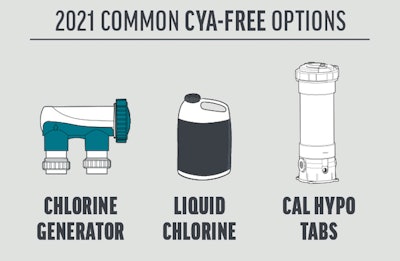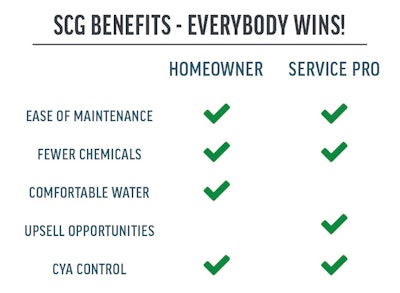
The following content is supported by one of our advertising partners. To learn more about sponsored content, click here.
Chlorine generators used to be the new fancy thing for swimming pools. Lately, maybe they are taken for granted. In case you forgot, salt has some benefits that are worth a good reminder. Maybe salt fell out of favor with you. Recent talks in online forums suggest many of you are passionate about the subject. Pool professionals love liquid chlorine, and chlorine tab feeders are great, too. In the end, finding the best solution for you and your customers is what it’s all about.
Salt systems today are a breath of fresh air. Customers and pool technicians love them because they’re reliable, low maintenance and require little attention. With all the new and improved systems on the market today, you should give salt another chance!
BENEFITS OF AN SCG
Chlorine generators can feel very “hands off” for many customers. Salt is added infrequently and inspecting the salt cell occasionally is easy enough. SCGs also require few, if any additional chemicals. A well-maintained salt cell, depending on the manufacturer, can last on average three to five years.
An SCG can also provide a more pleasant swimming experience. Other benefits to saltwater pools include less skin/eye irritation, reduced odors and comfort factors. Saltwater has a soft, silky feel that swimmers appreciate. Avoiding peaks and valleys of chlorine levels also adds to bather comfort.
What about tangible benefits? Making chlorine on-site means fewer buckets of tabs or bottles of liquid are bought, hauled and stored. Customers don’t want their homes to become
a chemical depot. And you save space and increase safety with fewer chemicals on board the service truck.
There are also chemical benefits to an SCG. Pool pros are concerned with high cyanuric acid (CYA) interfering with free chlorine. Without CYA, the sun quickly breaks down chlorine, leaving swimmers unprotected. You don’t have to be a mathematician to understand how quickly that becomes a problem.
Pools still need CYA, but it can be an issue if the level gets out of control from traditional chlorine tablets. CYA-free alternatives to a basic tab include liquid chlorine and calcium hypochlorite tabs. However, chlorine generators offer a convenient solution with other benefits.

WHAT IS THE DEAL WITH SALT AND CORROSION?
Some pool pros are very concerned about SCGs and have found them to be corrosive and damaging to pools. Corrosion is a bit of a catch-all term when it comes to salt that may mean a couple of things. Let’s tackle them here one by one.
In ANY POOL area, dis-similar metals can react causing an electrical imbalance and “corrosion.” Salt can enhance the effect. Small imperfections in stainless steel can also lead to a rust appearance. Cleaning stainless steel and avoiding dis-similar metals helps prevent this type of corrosion. Sacrificial anodes can also help.
Corrosion may also refer to decks and surfaces. Material type — whether it’s hard or soft — generally determines how it stands up to corrosive environments. Due to its chemical composition and molecular structure, natural stone is highly susceptible to corrosion. But saltwater doesn’t damage every surface. So, don’t throw the baby out with the
“saltwater!”
Understanding natural materials and their different properties is important. For some softer materials, salt may not be the best option. Regardless of type, surfaces should be sealed and protected whenever possible. Water alone, even without salt, can wear and break down unsealed surfaces.
BENEFITS TO YOUR BUSINESS
Sell the razor once, sell ‘em the blades forever! Service pros can make good money selling add-on systems like salt and advanced sanitizers. Supplementing regular weekly service with bigger ticket items like chlorine generators can help your business grow.
While everyone’s busy right now, long-term growth is still important. What are you doing these days to stay ahead of the curve? Salt can boost business and also save time on service routes. Some pool pros are already good at “upselling” to customers. The upsell is a great way to drive more to the bottom line.
There are even some pros that give the SCG away because salt is such a great selling point for their business. Customers will appreciate your efforts to improve their pool experience. You will appreciate benefits including shorter service calls and reduced chemical/additive inventory.
BEAT CHLORINE STOCKOUTS AND PRICE HIKES
Last year was full of challenges, but 2021 has already presented itself as a year full of encouragement. Pools and spas remain strong in U.S. markets. The “stay at home” trend supports a positive outlook for our industry, with promising sales in aftermarket products and new constructions. With such peaked interest, it’s a safe bet that many homeowners will still want a backyard retreat once the pandemic subsides.
The chlorine tablet shortage impacts consumer pricing and summer supply planning for many professionals. Without proper planning, the shortage could slow down any growth you are seeing in 2021. From distributors and pool pros to online forums, there’s an uptick in interest for alternatives to traditional pool chlorination — and not just
to reduce overall chlorine usage. A switch to salt could be the answer for many.
The overall impression across the industry leans toward salt being a good option for the shortage. If you already saw the benefits with salt, this is yet another advantage. A pool pro’s No. 1 priority right now is securing supplies. The industry must plan for the worst to avoid leaving customers in a bad spot.
The most prepared businesses look for long-term solutions, not just quick fixes. A properly sized and installed salt chlorine generator that is maintained regularly can last years and become a permanent solution for customers.
THE BEST SCG OPTION FOR YOU & YOUR CUSTOMERS
There’s a wide array of systems out on the market. Newer model designs are durable, affordable and serviceable. Some provide feedback letting you know the system is working and might even be compatible with ORP control systems.
Innovative products like Powerclean® Salt take the guesswork and hassle out of SCG maintenance. These “next generation” chlorine generators are easy to clean by hand and have a modern control center with improved cell design.
Powerclean Salt has a wider-spaced cell plate to prevent mineral buildup and permanent system damage. This salt chlorine system is made to be durable and serviceable. Powerclean Salt is also third party verified as an effective chlorine generator system; certified to UL-1081 and NSF/ANSI-50. This guarantees the chlorine output you can expect.
IT’S ALL ABOUT FINDING THE RIGHT SOLUTION
If you haven’t considered salt you should, and now is a great time to try it. If you’ve tried SCGs before and had a bad experience, maybe you should try out a newer model before making up your mind.
The goal is to find the best solution for your customer’s pool. Salt isn’t always the answer. But if you don’t consider salt, then how can you find the best possible solution?
CMP has created a guide to make it easy to switch to Powerclean® Salt, the next generation in chlorine generating systems. Use it to make the switch on your next salt installation.
For more information about Powerclean Salt and other advanced pool sanitizers, visit c-m-p.com/saltyswitch or call 800-733-9060.
WHAT IS A SALT CHLORINE GENERATOR?Commonly called salt systems, saltwater chlorinators, salt generators, the salt chlorine generator (“SCG”) is a pool pro’s friend. Saltwater pools are not an alternative to chlorine pools. It isn’t better than chlorine; it is chlorine.
|











































